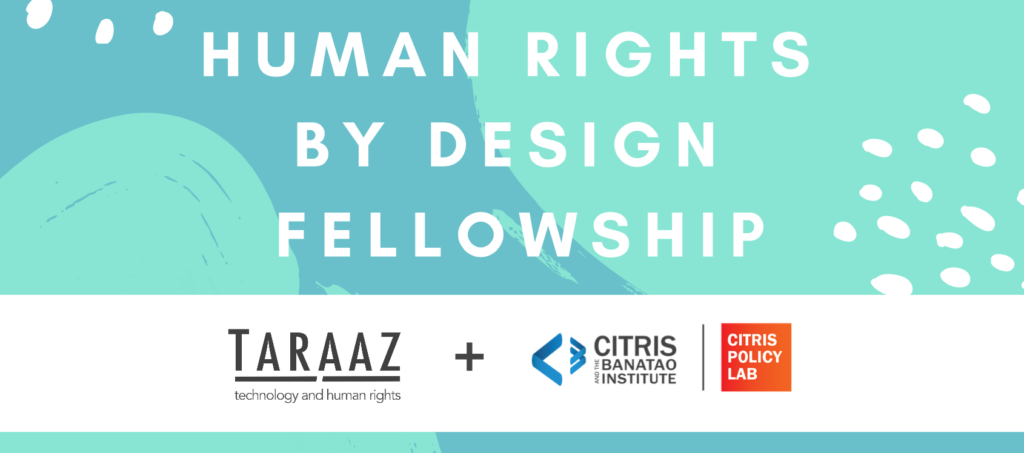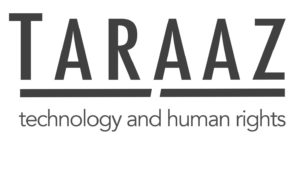Call for Proposal: Human Rights by Design Fellowship
Taraaz and the CITRIS Policy Lab are pleased to announce the launch of the Human Rights by Design Fellowship Program. Two $1000 fellowships will be provided to University of California graduate students (currently enrolled in Master’s, Ph.D., or J.D. programs at a campus in the University of California system) to carry out projects at the intersection of technology and human rights. During the fellowship program, fellows will work on an original project of their choice and receive feedback and support from the directors of the fellowship program. They will present their completed projects at a virtual event organized by Taraaz and the CITRIS Policy Lab.
Background
Technologies are not neutral. Values, principles, and standards are always built into technological systems. From the first stages of ideation to the last stages of testing and deployment, decisions are made by executives, policymakers, designers, and developers that create both positive and negative effects of technology on society. We believe that human rights, as enshrined in the Universal Declaration of Human Rights, should guide decision-making in the design and development of technologies. Therefore, we invite applicants to seek answers to the following question: How can we use the human rights framework as guiding principles in the design and development of technologies?
We welcome proposals that highlight the applicant’s strong commitment to the importance of ethical design in the development of technologies. Other criteria include the clarity and importance of the proposed research project; its concreteness and practicality; and its potential for being applied in industry-wide practices and/or STEM education. The deliverable of the research project may be in several formats, including but not limited to: a white paper, toolkit, video/audio materials, or a series of blog posts.
Eligibility
The fellowship is open to graduate students (from Master’s, Ph.D. or J.D. programs) at any University of California campus with an interest in exploring technology and human rights issues and experience in adjacent fields such as:
-
- Human Computer Interaction (HCI) focusing on Human-Centered Design, Value Sensitive Design, Participatory Design.
- Computer and Information Science
- Technology Law and Policy
- Science and Technology Studies
- Ethical Design and Development of Artificial Intelligence systems
Application Requirements
-
- A one-page project proposal addressing the following:
- The proposed nature of the project and its anticipated impacts. This should include mention of your project’s deliverable(s).
- How your project contributes to the development of the concept of human rights by design.
- Proposed methodology to carry out the project (successful applicants will work with the fellowship’s directors to build out the methodology further).
- An up-to-date Curriculum Vitae (CV).
- Two work samples: one to highlight your academic research, and another to show your ability to translate your academic research into a more public-facing output.
- A one-page project proposal addressing the following:
Finalists will be contacted to set up an interview and present their proposal (10 to 15 minutes) to the selection committee followed by a Q&A (20 to 30 minutes.)
Please send you application documents to rpakzad@taraazresearch.org and nonnecke@berkeley.edu with a subject line: [Applicant Name] Human Rights By Design Fellowship.
Fellowship Timeline
-
- Call for proposal deadline: September 30th, 2020
- Notification to finalists to set up an interview: October 15th
- Final decision made by: November 10th
- Fellowship duration: January 1st, 2021 until July 1st, 2021
- End of fellowship event: Mid-July 2021
About Us
Taraaz is a research and advocacy organization working at the intersection of Technology and Human Rights. We research human rights implications of digital technologies and turn our human rights-based research into practical tools, guidelines, and policy proposals to better inform technologists and other public and private entities in the design, development, and deployment of digital products and services.

The CITRIS Policy Lab supports interdisciplinary research, education, and thought leadership to address core questions regarding the role of formal and informal regulation in promoting innovation and amplifying its positive effects on society. The CITRIS Policy Lab is housed within CITRIS and the Banatao Institute, a four-campus institute operating on the campuses of UC Berkeley, UC Davis, UC Merced, and UC Santa Cruz. With over 400 faculty affiliates, CITRIS is an internationally recognized leader in research and development of information technology to address society’s most pressing challenges.
Relevant Work
The following resources may be helpful for applicants:
-
- Aizenberg, E., & Hoven, J. V. (2020). Designing for human rights in AI. Big Data & Society, 7(2), 205395172094956. doi:10.1177/2053951720949566. https://journals.sagepub.com/doi/10.1177/2053951720949566#articleCitationDownloadContainer
- Chung, A., Jen, D., McNealy, J. and Nguyen, S., 2020. From Legislation To Implementation: Exploring How To Prototype Privacy Bills Through. https://medium.com/mit-media-lab/from-legislation-to-implementation-exploring-how-to-prototype-privacy-bills-through-human-centered-4336af75f960
- Costanza-Chock, Sasha. Design justice: Community-led practices to build the worlds we need. MIT Press, 2020. https://mitpress.mit.edu/books/design-justice
- Friedman, Batya, and David G. Hendry. Value sensitive design: Shaping technology with moral imagination. MIT Press, 2019. https://www.vsdesign.org/
- “Guiding Principles on Businesses and Human Rights: Implementing the United Nations ‘Protect, Respect and Remedy’ Framework.” 2011. United Nations Human Rights Office of the High Commissioner. https://www.ohchr.org/documents/publications/guidingprinciplesbusinesshr_en.pdf
- Participatory Approaches to Machine Learning ICML 2020 Workshop: https://participatoryml.github.io/
- Yeung, Karen, Andrew Howes, and Ganna Pogrebna. “AI Governance by Human Rights-Centred Design, Deliberation and Oversight: An End to Ethics Washing.” The Oxford Handbook of AI Ethics, Oxford University Press, 2019. https://www.oxfordhandbooks.com/view/10.1093/oxfordhb/9780190067397.001.0001/oxfordhb-9780190067397-e-5




